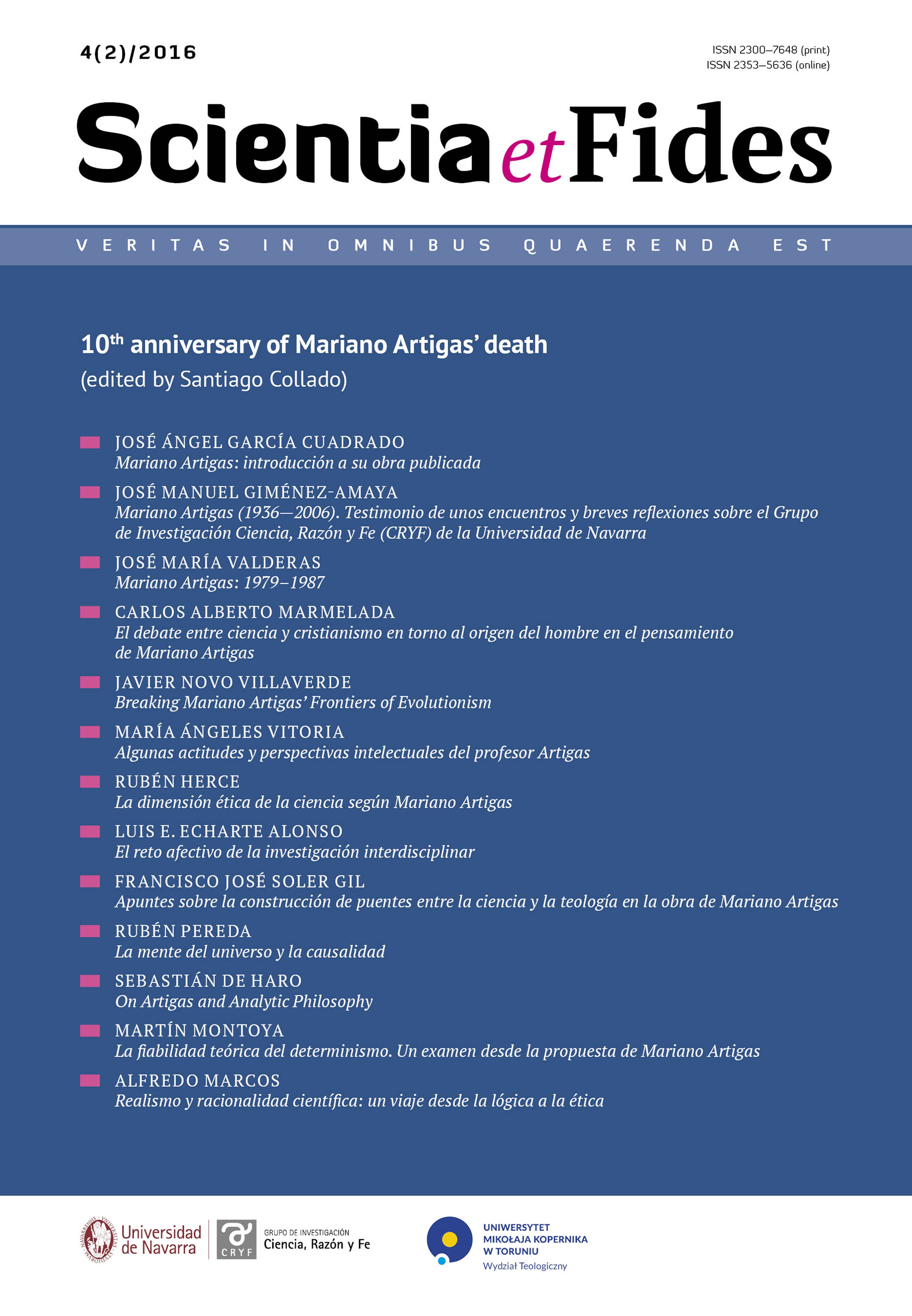La dimensión ética de la ciencia según Mariano Artigas
Keywords
Ethics, Scientific Activity, Mariano Artigas, Karl Popper, Philosophical Presuppositions of ScienceAbstract
The Ethical Dimension of Science According to Mariano Artigas
Many authors have written, from different approaches, about the relationships between ethics and science. In this work, we analyze how Mariano Artigas (a physicist, philosopher, and priest) did it. He gives great importance to ethics, which he considers a philosophical presupposition of scientific activity. A detailed analysis of his work allows to understand to what extent ethics is important for science. Specifically, we consider (1) the relationships of ethics with humans and with science; (2) the interweaving and the distinction between both of them; (3) the importance of ethics as a hermeneutical key in Popper; (4) and the emergence of ethics before, during, and after scientific activity.
References
Artigas, Mariano. 2009. Filosofía de la ciencia. Pamplona: Eunsa.
Artigas, Mariano. 2004. Ciencia, razón y fe. Pamplona: Eunsa.
Artigas, Mariano. 2000. La mente del universo. Pamplona: Eunsa.
Artigas, Mariano. 1998a. Filosofía de la naturaleza. Pamplona: Eunsa.
Artigas, Mariano. 1998b. Lógica y ética en Karl Popper. Pamplona: Eunsa.
Artigas, Mariano. 1995. La inteligibilidad de la naturaleza. Pamplona: Eunsa.
Bunge Mario. 1976. La investigación científica. Barcelona: Ariel.
Feynman, Richard. 1974. “Cargo Cult Science”, Engineering and Science, June: 11–13.
Herce, Rubén. 2016. “Penrose on What Scientists Know”, Foundations of Science, 21(4), 679–694. DOI 10.1007/s10699-015-9432-0
Juan Pablo II. 1979. Carta encíclica Redemptor hominis.
Kiesewetter, Hubert. 1995. “Ethical Foundations of Popper's Philosophy.” In Karl Popper: Philosophy and Problems, edited by A. O'Hear, 275–288. Cambridge: Cambridge University Press.
MacIntyre, Alasdair. 1978. “Objectivity in Morality and Objectivity in Science.” In Morals, Science and Sociality, edited by H. Tristram Engelhardt, Jr. and Daniel Callahan, 21–39. Hastings-on-Hudson (New York): The Hastings Center.
Mancini, Héctor L. 2014. “Comentarios sobre la cosmovisión científica en Mariano Artigas”, Scientia et Fides 2(1): 59–79.
Monod, Jacques. 1972. Chance and Necessity, New York: Vintage Books.
Penrose, Roger. 2005. The road to reality: A complete guide to the laws of the universe. New York: Knopf.
Popper, Karl R. 1992. In Search for a Better World. Lectures and Essays from Thirty Years, London and New York: Routledge.
Popper, Karl R. 1987. “Natural Selection and the Emergence of Mind”. In Evolutionary Epistemology, Rationality, and the Sociology of Knowledge, edited by Gerard Radnitzky y William B. Bartley, III, 139–155. La Salle, Illinois: Open Court.
Downloads
Published
How to Cite
Issue
Section
License
CC BY ND 4.0. The Creator/Contributor is the Licensor, who grants the Licensee a non-exclusive license to use the Work on the fields indicated in the License Agreement.
- The Licensor grants the Licensee a non-exclusive license to use the Work/related rights item specified in § 1 within the following fields: a) recording of Work/related rights item; b) reproduction (multiplication) of Work/related rights item in print and digital technology (e-book, audiobook); c) placing the copies of the multiplied Work/related rights item on the market; d) entering the Work/related rights item to computer memory; e) distribution of the work in electronic version in the open access form on the basis of Creative Commons license (CC BY-ND 3.0) via the digital platform of the Nicolaus Copernicus University Press and file repository of the Nicolaus Copernicus University.
- Usage of the recorded Work by the Licensee within the above fields is not restricted by time, numbers or territory.
- The Licensor grants the license for the Work/related rights item to the Licensee free of charge and for an unspecified period of time.
FULL TEXT License Agreement
Stats
Number of views and downloads: 478
Number of citations: 0



